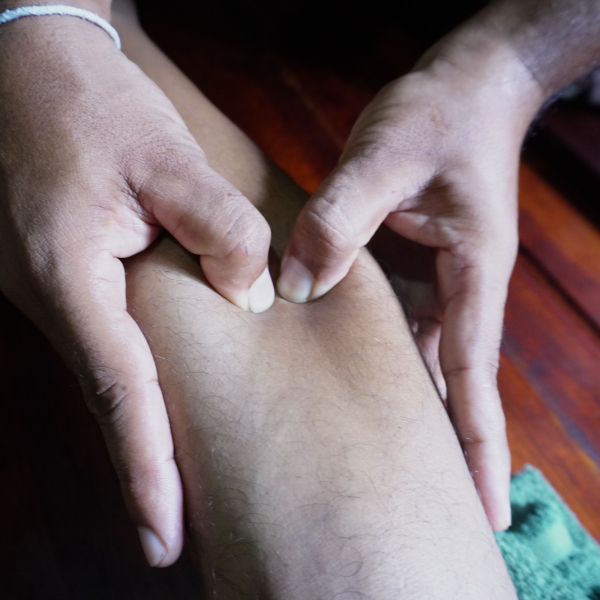Neurological Disorders (Vata Vyadhi)
Neurological disorders such as Parkinson’s Disease, Alzheimer’s Disease,
Dementia, Stroke, and Neuropathies significantly impact an individual’s quality
of life. These conditions affect the brain, nerves, and overall bodily
functions, making daily activities challenging. They not only cause physical
disabilities but also lead to emotional and cognitive impairments, affecting
relationships, independence, and mental well-being.

Causes of Neurological Disorders (Vata Vyadhi)
Parkinson’s Disease is a progressive disorder that mainly affects movement
due to the loss of dopamine-producing cells in the brain. It results in
tremors, stiffness, and slow movement. Alzheimer’s Disease and Dementia
primarily impact memory, thinking, and behavior, gradually leading to complete
dependence on caregivers. Stroke occurs when blood flow to the brain is
interrupted, causing brain cell damage and resulting in partial paralysis,
speech difficulties, or cognitive impairments. Neuropathies, including
peripheral neuropathy, cause nerve damage that leads to pain, tingling, and
numbness, primarily in the hands and feet.
The burden of these neurological conditions extends beyond the affected
individuals, placing emotional and financial strain on families and caregivers.
Conventional treatments aim to slow progression and manage symptoms, but they
do not provide a definitive cure. This makes it essential to explore
alternative healing systems like Ayurveda and Acupuncture, which focus on
overall well-being, balancing internal energy, and reducing nerve damage.
Early intervention is crucial in managing these disorders effectively. A
combination of therapies, lifestyle modifications, and stress management
techniques can significantly improve the quality of life for patients. While
each disorder has distinct causes and symptoms, a holistic approach that
addresses both physical and mental health can lead to better outcomes.
By integrating traditional and modern treatments, patients have a greater
chance of achieving long-term improvement, reducing dependency on medications,
and maintaining a fulfilling life despite these challenging conditions.
|
Key Feature
|
Parkinson’s
Disease
|
Alzheimer’s
Disease & Dementia
|
Stroke &
Aftermath
|
Neuropathies
|
|
Physical Symptoms
|
Tremors, muscle rigidity, slow movement, balance issues
|
Memory loss, confusion, difficulty recognizing people,
speech problems
|
Paralysis, loss of coordination, speech issues, cognitive
impairment
|
Numbness, pain, tingling, weakness in limbs
|
|
Causes
|
Loss of dopamine-producing neurons
|
Abnormal protein buildup in the brain, genetic and
environmental factors
|
Blockage or rupture of blood vessels in the brain
|
Nerve damage due to diabetes, infections, or trauma
|
|
Cognitive & Emotional Impact
|
Depression, anxiety, slowed thinking
|
Severe memory loss, confusion, personality changes
|
Emotional distress, difficulty in communication, memory
issues
|
Chronic pain, sleep disturbances, reduced mobility
|
|
Long-Term Effects
|
Gradual decline in movement and coordination
|
Progressive cognitive decline, complete dependency
|
Permanent disabilities, rehabilitation required
|
Chronic nerve pain, potential limb dysfunction
|
Cure from Neurological Disorders (Vata Vyadhi)
Modern medicine primarily focuses on symptom management
rather than curing neurological disorders. Parkinson’s Disease is treated with
dopamine-enhancing drugs like Levodopa, while Alzheimer’s and
Dementia patients receive memory-enhancing medications such as
Donepezil. Stroke management involves emergency medical intervention,
rehabilitation, and blood-thinning medications to prevent further episodes.
Neuropathy treatments include pain relievers, nerve repair medications,
and physical therapy.
Ayurveda aims to balance the body's energy systems and detoxify the body. Herbal formulations such as Brahmi, Ashwagandha, and Shankhpushpi are known to enhance brain function and reduce nerve degeneration. Panchakarma therapies like Abhyanga (oil massage) and Shirodhara (herbal oil drip on the forehead) help calm the nervous system and improve circulation. Dietary modifications, meditation, and yoga are also incorporated to support overall neurological health.
Acupuncture focuses on restoring the body’s natural energy flow (Qi) by
stimulating specific pressure points. For Parkinson’s Disease, acupuncture
helps improve motor function by targeting GB-34
(Gallbladder 34) and LI-4 (Large Intestine 4). Alzheimer’s and
Dementia patients benefit from DU-20 (Baihui) and Sishencong points
to enhance memory and reduce cognitive decline. Stroke rehabilitation is
accelerated by using points that stimulate blood flow and nerve
regeneration, while neuropathy patients experience relief from pain,
numbness, and muscle weakness through targeted acupuncture therapy.
For sustained improvement, a combination of
Ayurveda and acupuncture is the most effective approach. While
conventional medicine provides temporary symptom relief, Ayurveda and
acupuncture work on healing the nervous system, reducing
inflammation, and enhancing brain function naturally.
Holistic healing – TARA Ayurveda and acupuncture combine treatments
A combined approach of Ayurveda and acupuncture addresses both the physical and energetic aspects of neurological disorders. Ayurveda focuses on internal detoxification, balancing brain chemistry, and strengthening the nervous system, while acupuncture enhances blood circulation, reduces inflammation, and promotes nerve regeneration.
For Parkinson’s Disease, this combination helps improve mobility, reduce tremors, and enhance dopamine levels naturally. Alzheimer’s and Dementia patients benefit from herbal brain tonics and acupuncture stimulation, which delay cognitive decline. Stroke survivors recover faster as Ayurveda reduces post-stroke complications and acupuncture helps restore nerve function and muscle control. Neuropathy patients find significant pain relief and better nerve sensitivity when these two therapies are used together.
Unlike conventional treatments that require long-term medication use, Ayurveda and acupuncture offer a natural, side-effect-free approach to neurological health. Patients experience a gradual yet lasting improvement in their condition, making this combination an ideal solution for long-term healing.
If you or a loved one is struggling with neurological disorders, consider this holistic approach for enhanced recovery, reduced dependency on medication, and overall well-being.

